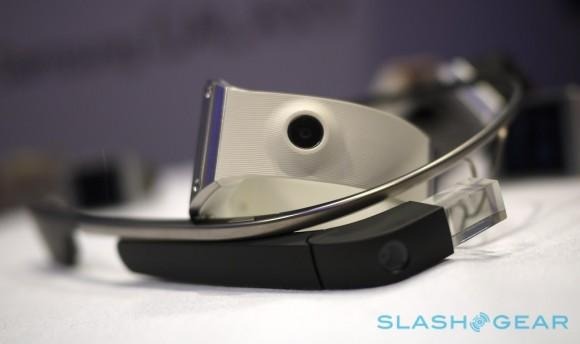Samsung Gear Glass Tipped For 2014
Samsung will launch a Google Glass rival, currently dubbed the Galaxy Gear Glass, sometime in Q2 2014 an insider claims, supposedly expanding its wearable family with a head-worn computer. The work-in-progress gadget is expected to arrive in April or May next year, according to Eldar Murtazin, following up the Galaxy Gear smartwatch which Samsung launched in Berlin last month. Although still unconfirmed by Samsung itself, the teased device needn't be too far from what Samsung has already developed for the wrist.
Murtazin's track record on pre-empting official announcements is mixed, though not for nothing has the Russian phone reviewer built his reputation for early access. That's included a number of Samsung phones, though he's yet to say who his source is on this wearable rumor.
Even if the "Gear Glass" chatter proves unfounded this time around, it's not hard to imagine Samsung stepping into the segment. The company has already confirmed that the Galaxy Gear is only the first of what's expected to be a family of wearables; a "sub-brand" much in the way that the original Galaxy spawned a number of iterations.
In many ways, the Galaxy Gear is already part of the way to being ready for your face, not your wrist. As we've already noted, the smartwatch overlaps with what we're familiar with from Google Glass at several points, including having a built-in camera, basic orientation sensors, and a reliance on a tethered smartphone for key connectivity.

More importantly, perhaps, it has a custom 800MHz low-power single core Exynos processor of Samsung's own making, paired with ARM Mali-400 graphics and 512MB of memory, to keep power consumption down while still providing enough grunt to run the pared-back interface. That interface, too, is key: Samsung supposedly started out with a more Android-styled UI, but then changed it at the last minute to a more minimalistic design.
It's a glance-friendly look that's suited not only to a display on your wrist but in your eye-line. Google has placed a lot of emphasis on its Glass interface and making sure developers creating Glassware don't overload the UI. That means minimal sub-menus and big, bold text, an ethos shared with the Galaxy Gear's simply-swiped navigation.
The key difference between Glass and the Galaxy Gear is the display, of course, though again that's somewhere Samsung could have an edge. The company is already rumored to be supplying Google with the display for its consumer version of Glass, with the headset tipped to switch from the transmissive LED-backlit panel of the current Explorer Edition to an OLED panel instead.
That could cut down on both power consumption and bulk. OLED panels use less power than their LCD cousins, and indeed only supply power to the active pixels – which makes perfect sense for a wearable display, where most of the UI color scheme is black. Meanwhile, since OLED doesn't require a separate backlight – unlike LCD – the display assembly as a whole can be smaller.
Google is believed to be using a "splitter" eyepiece on the consumer Glass, just as on the Explorer Edition, though Samsung could opt to use its own transparent OLED technology. Whether it would stick with the 320 x 320 resolution of the Gear, or go for a widescreen resolution instead of square, remains to be seen.
Samsung Galaxy Gear review:
The combination of a low-power display with a frugal processor could address the biggest issue Google has with Glass today: battery life. The Galaxy Gear manages a day or so of frequent use from its 315 mAh battery; in contrast, Google's wearable has a 570 mAh battery, but gets less runtime overall.
Samsung is well known for hedging its bets and pushing out multiple devices targeting different niches, in the expectation that at least some percentage will stick. With wearables predicted to be big business by 2017, and some arguing that head-mounted models are one of very few form-factors to resist being subsumed into smartphones, it seems even more likely that the South Korean firm would at least consider some Gear for your face.
